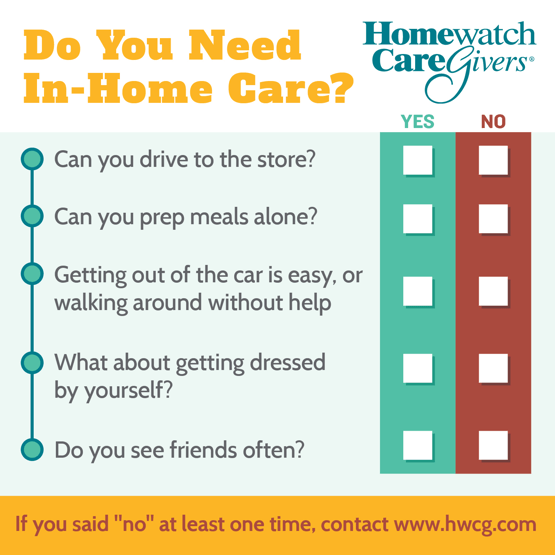Is It Time for In-Home Care?
Needing assistance is something people tend to put off…until there is a crisis.

There are times though when someone you love is in a slow decline, or you only see them once in a while so might not notice little changes building up. The question is, how do you know when it’s time for home care, for a little extra support so that your elder parent can continue to live at home safely?
Here are a few warning signs that might trigger a need for additional help at home as someone ages or whose abilities have changed due to a loss or living with a chronic condition:
- Meal preparation has become such a challenge that it’s mostly takeout or microwaved meals. Kitchens can be dangerous rooms in a home with sharp objects, slippery surfaces, and more. As vision changes, so too can the ability to see clearly when reading a recipe, chopping a vegetable, or washing a dish. Good nutrition is important at every age and an in-home caregiver can help with getting to the grocery store, preparing a meal, and cleaning up after. It can also be beneficial to have a companion to dine with if your loved is alone.
- When someone becomes socially reclusive—missing out on those crucial connections with family and friends—it might be a good time to visit their healthcare provider and rule out any medical issues to start. If the reason they are no longer engaging is due to a lack of transportation or a need to help get properly bathed, dressed, and groomed, then a caregiver can help with everything from safely entering and exiting the shower, putting on a favorite outfit, providing a ride to the hairdresser, and even bringing them to meet a friend. Sometimes a caregiver can become a friend to spend time with taking walks and enjoying conversation.
- When the house becomes chronically messy and was formerly tidy, it might be time for a caregiver who can do some light housekeeping while also being that friendly face they see regularly. Everyone feels better in a clean environment, but not everyone can keep up with the routine chores of cleaning as they age or deal with the symptoms of a chronic illness.
- Taking medicine can be good for you, but it can get confusing for some people. If a loved one has mixed up their medicine and had an adverse reaction, or perhaps forgot to take a pill or two, it might be time for a professional caregiver who can do medication reminders to prevent any missed doses or improper contamination with medicines.
Home care can be short-term or long-term depending on the need, and it can be one part of a long-term care solution.





